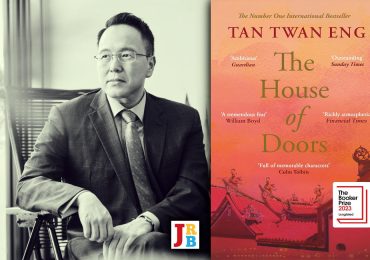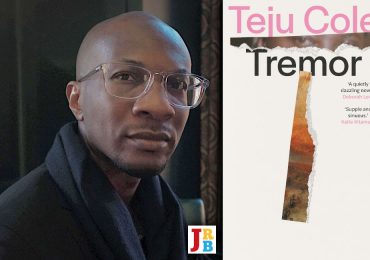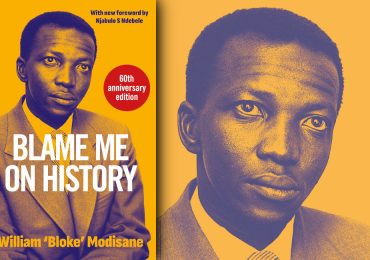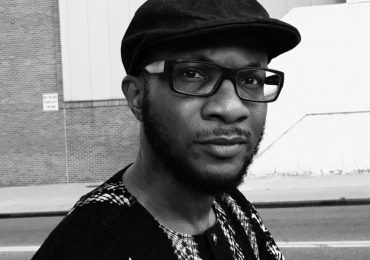The JRB presents an excerpt from Jeanne-Marie Jackson’s new book The African Novel of Ideas: Philosophy and Individualism in the Age of Global Writing.
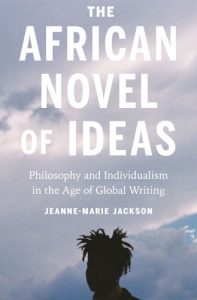
The African Novel of Ideas: Philosophy and Individualism in the Age of Global Writing
Jeanne-Marie Jackson
Princeton University Press, 2021
Read the excerpt:
Tendai Huchu’s Maestro of Lonely Learning
The Zimbabwean writer Tendai Huchu is provocative here because he does not simply back down from the challenge of global representation in favor of deceptively ‘local’ realities. He does not, in other words, revert to writing competent but structurally unoriginal realist novels when faced with the impossibly dense (and unequal) human archive of globalization. As Adam Kirsch has argued in his short book The Global Novel: Writing the World in the 21st Century, ‘Ambitious novelists [now] will find themselves writing global novels, not out of a cynical desire to elevate their commercial or critical rewards, but because individual lives are now lived and conceived under the sign of the whole globe’ (loc. 236). This is true of The Maestro, the Magistrate, and the Mathematician on both counts: it follows the lives of three Zimbabwean transplants to present-day Edinburgh, Scotland. Owing, presumably, to its formal experimentalism and many Shona points of reference (including passages of untranslated Shona), it nonetheless has not had anywhere near the commercial success of Afropolitan counterparts like Adichie, Teju Cole, Yaa Gyasi, and the like. Like Coovadia’s Tales of the Metric System (discussed in the next section), however, this may also be because Huchu ‘tests’ globality as a literary genre by reintroducing an outdated kind of novel of ideas within it as a hostile interlocutor. While the novel of ideas plotline is just one among many modalities within the novel’s confines, it nonetheless indicates globality as something that might be otherwise.
This means that while I agree with Kirsch on the basic premise that representing global connectivity is a key challenge for many ambitious contemporary novelists, his statement requires significant filling-in. One might better argue that globality is unavoidable for a particular sort of novelist, which is to say one with a bent toward macrocosmic ‘structure’ rather than, say, style on a more local or syntactic level, or even character. In introducing this caveat to Kirsch’s case, ‘globality’ also acquires more precision and argumentative heft. While Kirsch claims that it is ‘impossible to say that all global novels have certain formal qualities in common,’ because ‘the global is best thought of as a medium through which all kinds of stories can be told’ (loc. 227), I would argue that globality is most useful to the novel as precisely a formal designation. To be specifically ‘global,’ rather than the closely related ‘world,’ ‘transnational,’ or ‘diasporic,’ is to emphasize far-flung spatial connection as a fundamental component of plot or character composition. It comes closer, in the critical literature, to what Caren Irr has summarized as the trademark ‘world novel’ features of ‘multi-stranded narration, broad geographical reach, cosmopolitan ethics, multilingual sensitivity, and a renewed commitment to realism’ (175). And indeed, both MMM and Tales of the Metric System connect their national origins—Zimbabwe and South Africa, respectively—to a transnationally disarrayed plot structure. But Huchu’s three-part multi-stranded narration crucially forces each of the recurring narrative lines to relativize the other, creating a series of interlinked disruptions instead of orchestrating cohesion.
This puts a more cynical spin on what Rebecca Walkowitz, in Born Translated, calls the global novel process of ‘[collating] multiple voices and [transforming] selections into examples’ (128–29). Rather than assist in ‘gathering and affirming social groups,’ a social anthologizing function that Walkowitz attributes to the British–Caribbean novelist Caryl Phillips, Huchu’s MMM ends up revealing what globality cannot structurally support: namely, intellection. Philosophy is diffused by the multi-stranded structure of the novel in which it appears, piquing the reader’s interest in it as one possible mode of existing, but never quite seeing through any single idea. Huchu uses the novel form to in some sense audition death-by-ideas through Demons, reflection on which he eventually nests within only one of his three interwoven, character-driven plots. The Maestro, a Zimbabwean who works at a grocery store in Edinburgh, is soul-deadened and overwhelmed there by ‘the incredible range of choice on display, so that an elementary defense mechanism [kicks] in, a fuse breaking the circuit, shutting it down’ (37). He lives by himself, mostly on greasy takeout food, inside a small, disheveled apartment, with books ‘piled on the floor, against all four walls of the room, rising up to window level’ (41).
Notably, the Maestro is the last of the three central characters to be introduced, so that his narrative through line appears as an exhausted punctuation mark to the less-examined lives of the Magistrate and the Mathematician, with which the reader is already engaged. The Maestro is described just six pages into his first appearance in full thrall to the medieval Roman philosopher Boethius’s The Consolation of Philosophy, ‘which he was reading, and had been, slowly, contemplatively for a week’ (ibid.). Written during Boethius’s year in prison while awaiting execution by the Ostrogoth king Theodoric the Great, the text is structured as a conversation with Lady Philosophy, loosely inspired by the form of Platonic dialogue. And yet the Maestro is decidedly a loner, communing only with his books, to which he returns ‘time and time again, hoping with each reading to unlearn the last and discover it anew. Each time he read the poetry of the words, he felt a kinship, as though he too was in bondage, searching for a higher meaning to life through reason’ (ibid.). His reading doesn’t culminate in a renewed understanding of life so much as it perpetuates a self-isolationist cycle of thinking about thinking.
To this point, the Maestro’s philosophical contemplation is always closely linked to a literary point of reference. ‘Did this moment exist before he’d read [Jon] McGregor,’ he asks himself at one point during a Boethius binge, ‘or had it always been there? And if it had, then why hadn’t he noticed it before? Perhaps, he thought, it did not exist and only came to be after I read the book. If that was the case then he had to accept the terrifying notion that fiction had created a real moment in the real world from nothing but word’ (42). It is also his anxiety about the power of language over life that prompts the novel’s first musings on suicide, as a means of ‘testing God,’ boldly echoing Kirillov’s literary-epistemological significance but not yet venturing to invoke him directly. ‘In that moment,’ as the Maestro hangs out reading on his windowsill and his thoughts veer to the exuberance of mortality, ‘he pondered if he were to let go, to cast himself down from this ledge … if he let go, would He send one of His angels so that not a hair on his body would be harmed’ (ibid.). In fact, however, the Maestro is just waxing poetic with the notion of divine salvation. His outlook on life is dire, and worth quoting at length:
The Maestro always came to the same conclusion, he would hurtle into the void, accelerating at nine point eight metres per second squared, simple physics, the predictable effects of gravity on an eleven stone, twenty-seven year old male body falling through the atmosphere, leaving only the hope that through the panicking, firing neurons there would be a moment of clarity in which everything is illuminated, a split second in which life itself was explained, the meaning of it all, past, present and future laid out, all making sense so that when, when he hit the ground, then at least it would have been worth something more than the aching emptiness he felt every day with each sunrise and sunset. The image of the falling man from 9/11 flashed into his mind. What had the man thought on the way down, was he just thinking, oh fuck, oh fuck, or was there some fundamental insight on the journey, plummeting to earth, the concrete-scarred ground rising to meet him? (42–43)
This, then, is the immediate context in which reference to Dostoevsky first appears: he is immediately listed on this page alongside Kafka, Sartre, and Nietzsche as one of the Maestro’s hopes for understanding. His free-indirect narrative style grows increasingly febrile as he moves deeper into intellectual solitude, and the Maestro’s first section is then jarred into coming full circle to where it started; that is, with the disillusionment of infinite choice. The phone rings; he speaks briefly with his one point of social contact, a Polish woman named Tatyana, and then reverts to aloneness in his hovel. ‘He switched the TV on,’ Huchu writes, ‘flicking through many channels, and failing to find anything worth watching’ (44).
The Maestro’s habits of mind can be summarized as follows: philosophy gives way to literature; literature gives way to a sense of meaninglessness and mediation; and yet following through on this sense of meaninglessness gives way to technological disruption. (Or, in order of topic, Huchu moves from Boethius to Jon McGregor to suicidal ideation to distraction with a transnational cable television package.) Suicide comes into view here as an ‘idea’ in its own right rather than as an action meant to fulfill an intellectual proposition. The hazy line between lived and second-hand experience also seems to deflate the importance of ‘experience’ altogether as the bedrock of self-formation. Indeed, the blur the Maestro experiences of acute, imagined sensation (the feeling of concrete) with a received virtual image (the falling man on 9/11) is part of his profound self-disorientation. As Simon During suggests as part of a broader argument in Against Democracy, in devaluing ‘experience’ as the Maestro’s main currency—his life is the thing that disrupts his thoughts, not that which sees them through, or makes them meaningful—Huchu in some ways departs from the conceptual basis of liberal democracy. ‘The category [of experience] is so valuable to democrats because experiences seem to precede traditions, learning, hierarchies, and morality,’ During writes.
Furthermore, experiences … are like democratic citizens who enter into their privilege simply by being born … in a particular place at a particular time, and who need share little. From within this logic democracy [offers] experience itself as a basic criterion of value, as if societies are good just to the degree that they deliver rich and full experiences rather than to the degree that, say, they encourage virtuous living or offer social order or unity or purpose. (6)
The Maestro does not think and therefore exist; he exists in the contemporary world and is therefore unable to think. He is certainly disillusioned with the populist leveling that technological connectivity as a form of shared experience has brought (or at least, that it has accompanied), but there is no clear political or economic association with his elitism here.
The Maestro’s inability to avoid distraction continues apace with his self-isolation as his plot progresses, always with at least one other plot intervening between each of his appearances. Interestingly, references to a global literary marketplace increase as his determination to sequester himself from it grows, creating a gap between the Maestro’s will and his context. Prompted by a return to the Doris Lessing novel The Grass Is Singing, he contemplates his involvement in a particular liberal-multiculturalist niche of global publishing by acknowledging that ‘most of his choices were made for him by the Guardian, or a short reference in the introduction of some seminal text’ (131). While he judges films freely, owing to a lack of real knowledge, with novels he ‘was more likely to fear that he didn’t get it, rather than to say that a book was bad. He envied the brave souls on Amazon, the dissenters hiding behind anonymous avatars, who gave War and Peace one star and told Tolstoy to go stuff it—too long, too slow, too many characters, what’s with all the digressions, just get on with the story, Nikolayevich’ (ibid.). This creates an oddly tense context for the moment when the Maestro comes around to openly likening himself to Kirillov. After a particularly frenetic passage in which he throws away his phone, internet router, and computer in the name of claiming reading as ‘a religious vocation, a retreat,’ from which he ‘had to push the world out so he could focus’ (137), he announces that he ‘felt like Kirillov, an idea incarnate’ (138). At this point the reader might well ask, wait, what idea? Kirillov’s incarnation of philosophy is specific: he wants to kill himself to stretch free will to its limit, thereby liberating the world from the need for a higher authority. The Maestro here claims only the idea of ideas, an escape from the public rather than an assertion of his individual power to represent and redeem it.
~~~
- Jeanne-Marie Jackson is assistant professor of English at Johns Hopkins University and the author of South African Literature’s Russian Soul.
Publisher information
The African Novel of Ideas focuses on the role of the philosophical novel and the place of philosophy more broadly in the intellectual life of the African continent, from the early twentieth century to today. Examining works from the Gold Coast, South Africa, Uganda, and Zimbabwe, and tracing how such writers as JE Casely Hayford, Imraan Coovadia, Tendai Huchu, Jennifer Nansubuga Makumbi, and Stanlake Samkange reconcile deep contemplation with their social situations, Jeanne-Marie Jackson offers a new way of reading and understanding African literature.
Jackson begins with Fante anticolonial worldliness in prenationalist Ghana, moves through efforts to systematize Shona philosophy in nineteen-seventies Zimbabwe, looks at the Ugandan novel Kintu as a treatise on pluralistic rationality, and arrives at the treatment of ‘philosophical suicide’ by current southern African writers. As Jackson charts philosophy’s evolution from a dominant to marginal presence in African literary discourse across the past hundred years, she assesses the push and pull of subjective experience and abstract thought.
The first major transnational exploration of African literature in conversation with philosophy, The African Novel of Ideas redefines the place of the African experience within literary history.


